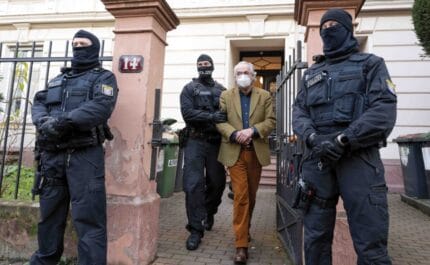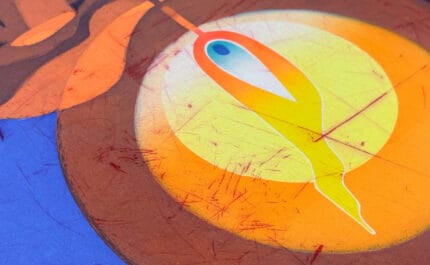To live and die in America
As part of Tehran’s furtive underground scene, Yellow Dogs fantasised about moving to the US and making music without the risk of imprisonment. On 11th November 2013, half the band was shot dead in their house in Brooklyn. Orlando Crowcroft, who interviewed them after they escaped Iran, looked back at how they achieved their wildest ambitions – and how their dream turned into a nightmare…
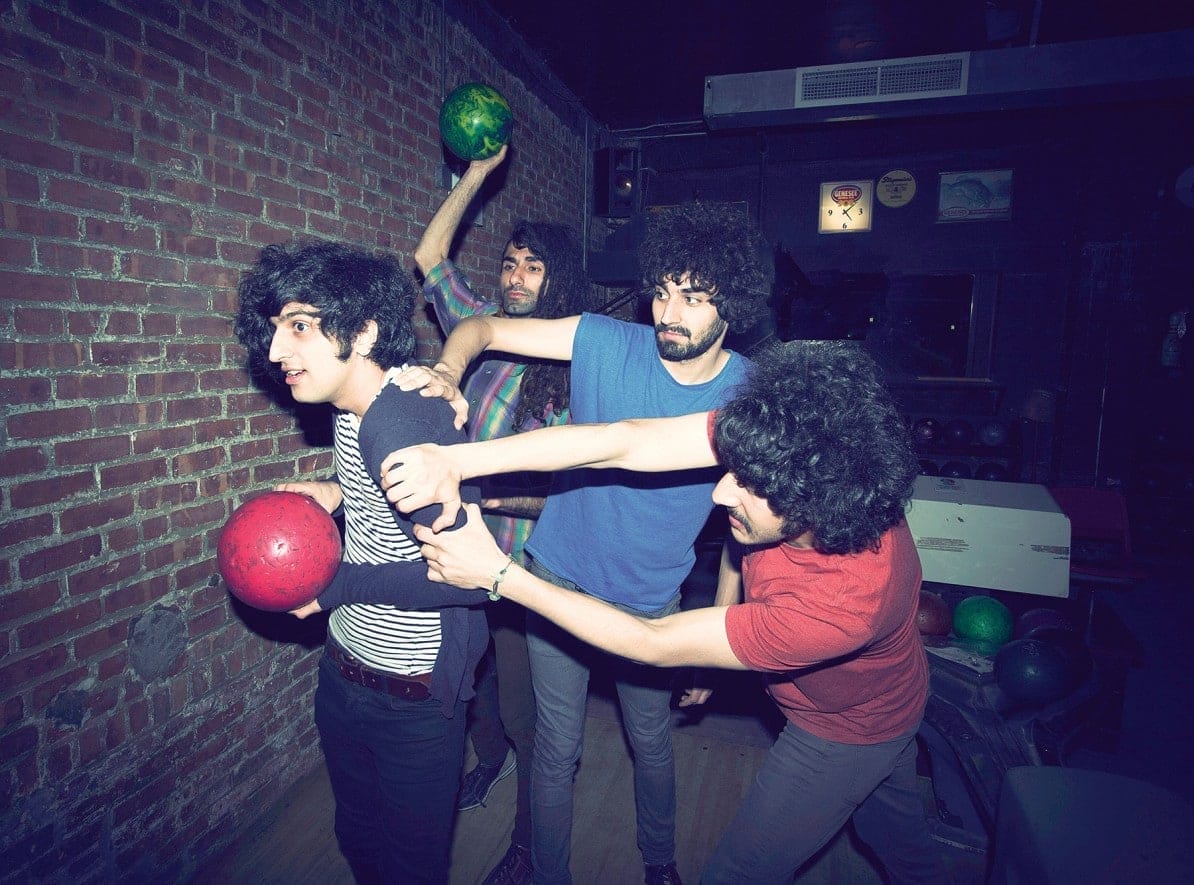
Yellow Dogs band members, from left, Koroush “Koory” Mirzaei, Obash Karampour, Arash Farazmand and Soroush Farazmand. Photo: Danny Krug/AP/Press Association Images
11th November 2013 (Taken from: #13)
“These are the darkest hours of our lives.
We are in shock, awe, blinded with
rage and paralysed with grief.
Everything we had worked for was finally coming true.
The future was so incredibly bright”
– Yellow Dogs,
12th November 2013
On 11th November 2013, Brooklyn musician Michael Vallarelli was at his desk early, reading through the headlines online when news began to break about a shooting involving a local band. “I immediately got chills,” he recalls. “I had a feeling I would know the band. When I read it was them, I was completely shocked. I will never forget that moment.”
The news was that four young men were dead. Two of the victims were brothers Arash and Soroush Farazmand, the 28-year-old drummer and 27-year-old guitarist in the band Yellow Dogs. Rising stars of Brooklyn’s booming music scene, the band had moved to New York from Tehran in 2009 to escape Iran’s rigid conservatism and pursue their dream of simply being allowed to make music. The third victim, 35-year-old Ali Eskandarian, was a friend, fellow musician and housemate. The shooter, who ultimately turned his gun on himself, was named as Mohammadi Rafie, a disgruntled musician who’d been thrown out of Yellow Dogs’ ‘sister band’ the Free Keys a year earlier. Two members of Yellow Dogs – guitarist Obash Karampour and bassist Koory Mirzeai – were fortunate and weren’t at home that night.
The Yellow Dogs’ journey, which had started with raucous, booze-fuelled and highly illegal shows in boarded-up Tehran basements, had ended in the most awful way imaginable.
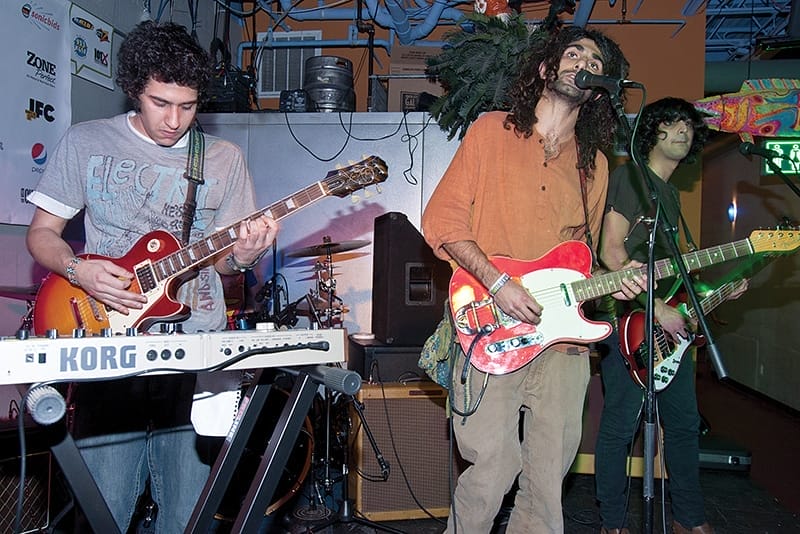
Lance Dawes/AP/Press Association Images
On 8th December 2009, four young Iranians turned up at the US embassy in Istanbul for an interview as part of their visa application. There they told bemused officials a story of sex, drugs and rock ‘n’ roll; of risky underground shows, threats from authorities, and of a precious haven of artistic and political freedom at the heart of the Islamic Republic of Iran.
In the write-up of the meeting, which was revealed when WikiLeaks published leaked US diplomatic cables in December 2010, one senses the unnamed US official struggling to hide their fascination with the “astute, well-informed and resourceful 20-something” applicants. The embassy report draws attention to the band’s vivid description of a “small but crazy” underground club scene where “drugs are cheap and easy to find, creative expression’s at its most free, and participants are among Iran’s most tech-savvy citizens.”
Yellow Dogs formed in 2006 while they were still in school. I interviewed Obash Karampour shortly after his band had arrived in the US in 2010, and he recalled their first ever gig, held in a basement of a house in Tehran’s western suburbs. The band had boarded up the windows and doors, and had friends looking out for the police because hundreds of young people were drinking, smoking and dancing inside. “We really had no idea what crime we were committing by playing music,” Karampour told me. “At our concerts everything that was illegal was legal. Women didn’t have to wear the veil, boys and girls were together, there was a dancefloor. None of those people had ever been to a rock concert before, including me.”
They told bemused officials a tale of sex, drugs and rock ‘n’ roll; of risky underground shows and threats from the authorities”
The band told US officials that they’d been part of a fully-fledged, several thousand-strong rock scene in Tehran, and that smaller similar scenes existed in Esfahan, Shiraz and Tabriz. Stressing that they did not use drugs themselves – a wise caveat in visa interviews with embassy officials – the band said heroin and opium were readily available, as well as homemade amphetamines. But it wasn’t all about drink and drugs. The underground scene offered the most free expression it was possible to have in Iran. All political, cultural and religious views were tolerated and there was a lively exchange of books, photography, music and other forms of artistic expression. It was a space in which young Iranians could breathe, but for Yellow Dogs it could only offer temporary relief.
The band’s basement venue survived for a while, but then had to be abandoned. “We did everything we could to avoid being seen,” Karampour told me. “But after our second show we heard that some neighbours were calling the cops, telling them that weird activity was going on. So we said, ‘Fuck that, we are never playing here again.’” The band moved to a ‘practice room’ on the outskirts of Tehran, which is how they met Bahman Ghobadi, the acclaimed Kurdish-Iranian director of ‘A Time for Drunken Horses’. He featured Yellow Dogs in his award-winning film ‘No One Knows About Persian Cats’, a semi-fictional story of musicians struggling against censorship and repression in Tehran and dreaming of a life in the United States. The film captures Yellow Dogs’ passion for their music as well as their irreverent sense of humour – in one scene we see them laughing at the absurdity of their situation when the young boy living across the road from them hears them playing their instruments and calls the police.
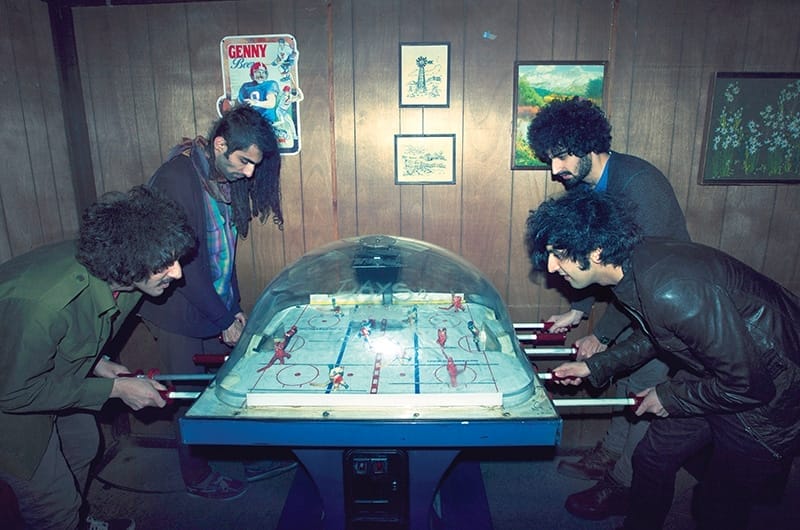
Danny Krug/AP/Press Association Images
The film was a success outside of Iran (where it was banned), winning a Special Jury Prize at the 2009 Cannes Film Festival, but it earned Yellow Dogs unwanted attention at home. Indeed, Ghobadi and most of his cast and crew fled Iran in the wake of the film’s release.
“Suddenly the government became very interested in us,” recalled Karampour. “They made a TV series about musicians and said all these people are Satanists and we have to execute all of them and they don’t believe in God. So after we saw that stuff and after the film we thought, ‘Man, we have to get out the country before we get our asses busted.’” A high-profile interview on CNN made the band feel even less secure, and when they arrived in Istanbul to play their first ever legal show, it was time to get serious. It was billed as a short-term trip, but they knew they were unlikely to be returning home. They extended their stay in Turkey and made plans to visit the US embassy.
Within a year, all four members had received US visas, which meant they could begin applying for political asylum [Arash was the last band member to be granted asylum, just a few months before his death]. They rented a house in Brooklyn, where they lived with Ali Salehezadeh, who became their manager, and Ali Eskandarian, who was about to publish his semi-autobiographical novel, ‘Golden Years’, at the time of his death.
In December 2011, they were joined in the house by their musician friends from Tehran, the Free Keys. The Free Keys had been unable to get a visa for their bassist, so they found a replacement in another musician who’d been part of the Tehran scene. His name was Mohammadi Rafie.
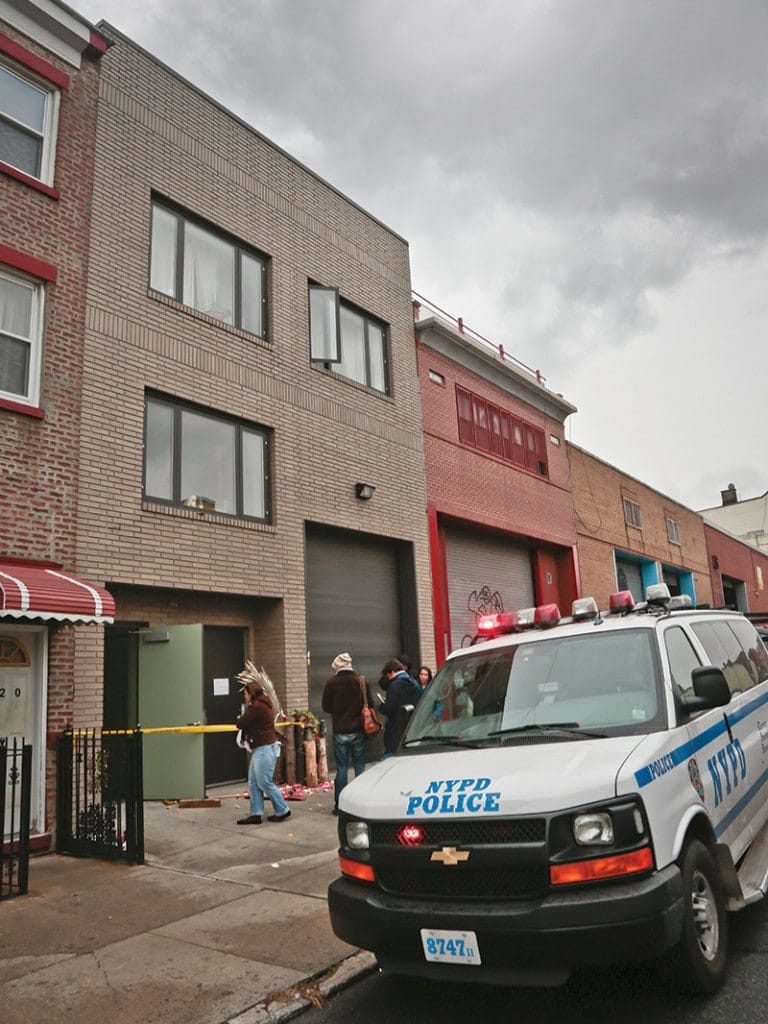
The Yellow Dogs house in Brooklyn on Tuesday 12th November, the morning after two members of the band were shot dead by Ali Akbar Mahammadi Rafie. Photo: Bebeto Matthews/AP/Press Association Images
Yellow Dogs didn’t arrive in the US with the intention of being an Iranian band. They didn’t sing about politics or write protest music. They had attracted unwanted attention in Iran not because of what they sang about, but for the fact they sang at all.
In Brooklyn they refined their sound – a joyous, danceable mix of hard rock, punk and funk. In their videos for songs such as ‘This City’ and ‘Dancefloor’, the quartet’s excitement to be making films in New York is quite palpable.
In another promo video, the dreadlocked Karampour says they still can’t believe they’ve achieved what friends in Iran would dismiss as a crazy fantasy – to live in New York. “If we were born in London or LA, it wouldn’t be that exciting for us,” he says. “But right now we appreciate everything. If we think about what we’ve been through, where we’re from, and where we’re playing now… it’s joy and adrenaline.”
Life was good. They befriended bands such as Nada Surf and Black Lips, whom they supported at Webster Hall. They played at South by Southwest, a vast music industry conference in Texas, and in 2012 they performed at New York’s famous Mercury Lounge, their biggest hometown show to date.
“Yellow Dogs loved the Brooklyn music scene and they were loved by the scene,” says Phone Home’s Michael Vallarelli. “Kids would dance non-stop during their sets.”
They were granted asylum in the US because they weren’t safe in Iran – and they were killed in a shooting spree, that most American of crimes”
Kevin Diamond, a 30-year-old singer and guitarist of the band Shark? played with Yellow Dogs twice in 2013. “They were just another Brooklyn band trying to make it,” he recalls. “It didn’t seem strange that they were from Iran. They were another group of dudes who had escaped a shitty hometown to move somewhere they thought would be more supportive of their art. They came to Brooklyn for the same reason we all did. You can be who you want here.”
In the summer of 2013, when Arash was finally granted asylum, Yellow Dogs could start thinking about an overseas tour, and perhaps meet friends and family in Istanbul. They were also working towards making their debut album. And that, tragically, is where their story ends.
Nobody knows why Mohammadi Rafie killed three of his former friends. It’s unclear how he was able to get hold of a semi-automatic rifle. We know he had been dropped by the Free Keys in May 2012 due to musical and personal differences – there were accusations he’d stolen money. We also know that he hadn’t seen the members of Free Keys or Yellow Dogs since then.
He’d scrambled across the roof of a neighbouring building with his gun stashed in a guitar case. Once on the terrace of Yellow Dogs’ house, he moved from floor to floor shooting everyone he saw. He shot Eskandarian dead through a third floor window, and killed Soroush and Arash in their bedrooms. He shot a fourth person in the leg before climbing back onto the roof and shooting himself in the head.
It’s a cruel irony that Yellow Dogs were granted asylum in the US because they weren’t safe in Iran – and were killed in a shooting spree, that most American of crimes. The surviving members have signalled a desire to carry on and honour the memory of their friends.
“We are left with pain, emptiness and so many questions that won’t ever be answered,” Obash and Koory said in their statement. “We wanted the world to discover us as we were: a community of musicians defined by our music. This is not the way we ever imagined the world would learn of our story.”
Slow Journalism in your inbox, plus infographics, offers and more: sign up for the free DG newsletter. Sign me up
Thanks for signing up.

